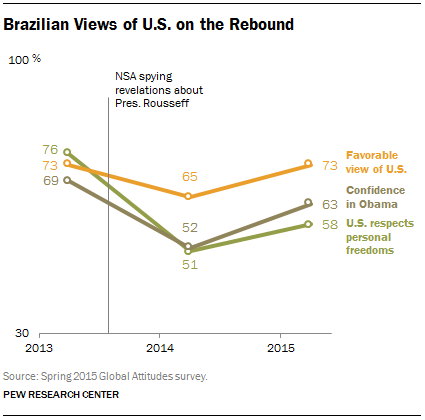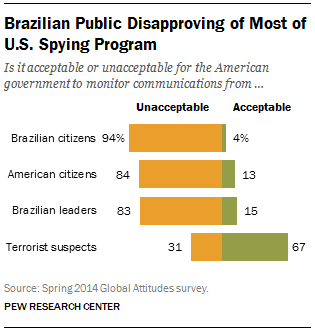
Revelations in September 2013 that the U.S. government had monitored the private communications of Brazil’s President Dilma Rousseff had strained relations between the two countries. But Rousseff’s arrival in the U.S. this week for a meeting with President Barack Obama comes at a time when public sentiment about the U.S. in Brazil has almost fully returned to the overwhelmingly positive opinions held before the surveillance controversy.
Rousseff originally had been slated to travel to Washington in October 2013, but she canceled that meeting to signal her displeasure over the National Security Agency monitoring.
Nearly three-quarters of Brazilians (73%) have a favorable view of the U.S. – the highest level of approval among the Latin American countries surveyed, according to a new Pew Research Center survey. Young people ages 18-29 (84%) and those with more education (80%) are especially likely to express pro-American sentiments. In our 2013 survey, fielded before the Edward Snowden revelations, 73% of Brazilians also had a positive view of the U.S. But ratings dropped 8 percentage points in 2014 to 65% before rebounding this year.
Brazilian confidence in Obama also dipped in 2014 but bounced back this year. More than six-in-ten Brazilians (63%) say they have confidence in Obama to do the right thing regarding world affairs, up 11 percentage points from last year. The current finding is more in line with pre-Snowden ratings from 2013, when 69% in Brazil expressed confidence in the American president.

While overall views of the U.S. and Obama have rebounded, such is not the case when Brazilians are asked if the U.S. respects the personal freedoms of its citizens. Brazilians’ opinions of the U.S. on that issue took an especially large dive after the spying revelations, and they have not yet regained their confidence in the U.S. In 2013, 76% of Brazilians felt the American government respected the personal freedoms of its people. In just one year, this sentiment decreased 25 percentage points in 2014, to 51%. Today, 58% of Brazilians say the U.S. respects individual liberties, a slightly larger share than last year but still well below 2013 opinions. About a third (34%) say the U.S. government does not respect the personal freedoms of its citizens.
The NSA’s data surveillance programs undoubtedly played a large role in Brazil’s sour opinions of the U.S. When asked whether they found it suitable for the American government to monitor the communications of Brazil’s leaders, more than eight-in-ten Brazilians (83%) said this practice was unacceptable. Brazilians also voiced strong opposition to monitoring American citizens (84% unacceptable) and Brazilian citizens (94%).